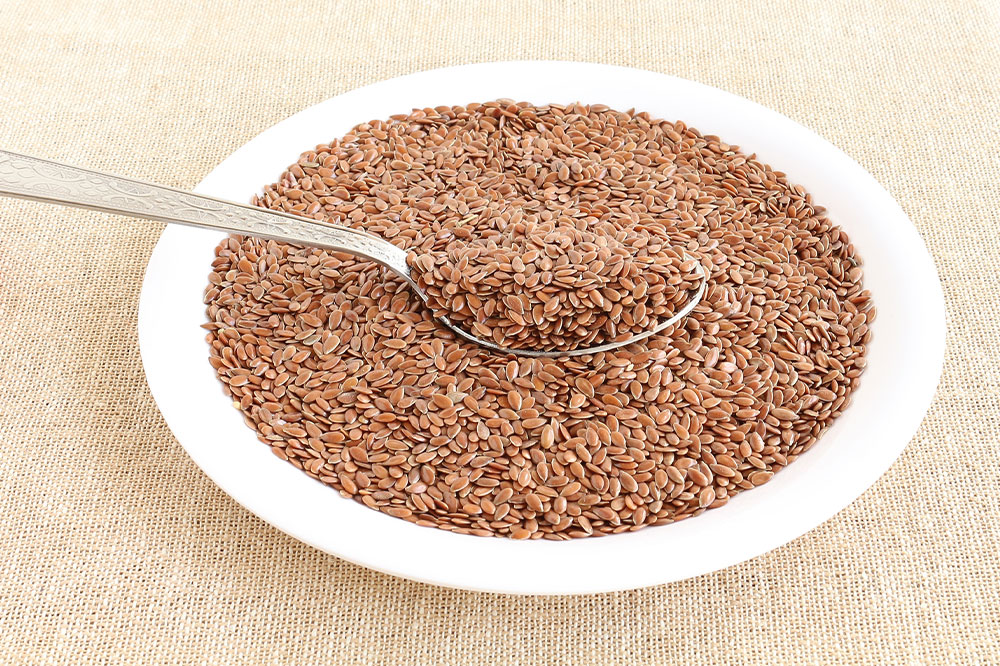Periods are inevitable, and so are the cramps and pain that accompany them. While menstruation is cyclical, the anxiety and discomfort that comes with it do not have to be. Certain foods, exercises, and habits can address menstrual pain to a great degree. Foods, especially, play a big part in relieving menstrual pain in women of all ages. Here is the list of foods to manage period pain during the tricky part of the month:
Flax seeds
Seeds are a prime source of omega-3 fats, magnesium, iron, potassium, and protein, all of which contribute in different ways to making the body stronger and more resilient to period-driven cramps and pain. While most seeds tick all the boxes, flax seeds are prime examples of these qualities. Flax seeds help reduce constipation, a major menstruation symptom, in women and thereby help ease the symptoms of periods.
Oranges
Citrus fruits such as oranges and lemons contain vitamin C, an anti-inflammation nutrient. Vitamin C is a potent antioxidant that helps counter the heat and cramps that accompany a woman’s menstrual cycles. Apart from being antioxidant-rich, oranges are also hydrating agents due to their high water content. This is why consuming oranges during menstrual cycles can greatly alleviate cramps in women. These two reasons make oranges and lemons absolute superfoods to manage period pain every month without breaking a sweat.
Strawberries
Like citrus fruits, berries are also useful foods to offset the severity of menstrual cycle symptoms. Strawberries, like oranges, contain loads of vitamin C and around 3 to 4 grams of fiber. Several research studies have found that consuming strawberries on a daily basis can drastically reduce period cramps in women. Moreover, strawberries also have several anti-inflammatory attributes, making them ideal foods to cut down body heat more effectively.
Milk products
Dairy products such as milk, cheese, butter, yogurt, kefir, and ice cream are supreme calcium sources. Calcium is one of the elements that not only reduces menstrual symptom severity, but also helps with fatigue, mood changes, and other aspects of periods in women. For instance, calcium helps relieve menstrual pain more effectively than some other nutritive elements.
Additionally, milk is also a rich source of vitamin D, magnesium, and vitamin E. All these elements are a significant part of the supplements used to combat menstrual pain.
What’s more? Milk can also efficiently provide hydration to its consumers, reducing the likelihood of cramps in women during the menstrual phase.
Bananas
Most healthcare and food experts would advise women to eat bananas during their menstrual phase, and not without valid reasons. Bananas are rich in fiber and vitamins. These elements make them a valuable ally to have during periods, as bananas can ease bowel movements and reduce the pain and cramps associated with periods in women.
However, bananas also contain large amounts of natural sugar. So, women with blood sugar problems must consume them judiciously. Also, before making extensive changes in their daily meals, women must consult their doctor.
Salmon
Another indispensable component of most people’s daily meals, cold-water fish such as salmon, sardines, and tuna, are superfoods that help manage period pain. Salmon, in particular, is loaded to the gills with omega-3 fatty acids. As implied earlier, omega-3 fatty acids are anti-inflammation agents and effective pain relievers. These qualities of this nutrient are experienced most during periods by women.
Additionally, salmon is also a great source of protein, vitamin B6, and vitamin D, all of which help reduce the severity of menstruation symptoms in women. Vitamin D boosts the intake and absorption of calcium too. This is another massive positive, as calcium also helps relieve period pain. On the other hand, vitamin B6 has been scientifically found to reduce irritability during periods in women.
Oatmeal
Like salmon and milk, most people consider oatmeal an irresistibly delicious and undeniably healthy breakfast meal. While all those are true, most people may not know about oatmeal’s incredible capabilities to counter menstruation symptoms.
Oatmeal contains loads of fiber, an element that makes the excretion of feces much easier during menstrual phases. This food also contains a healthy amount of magnesium and zinc, both of which can reduce cramps and regulate serotonin, a powerful brain chemical that helps maintain one’s mental health during their periods.
Eggs
According to the United States Department of Agriculture, one can consume two hard-boiled eggs in the morning to absorb nearly 100 international units (IU) of vitamin D. Eggs are arguably the best source of vitamin D, a useful nutrient to fight cramps and pain during one’s menstrual phase. Additionally, vitamin D’s calcium absorption abilities also make it a useful element to strengthen bones and reduce the severity of periods. All these factors make eggs an invaluable superfood for managing period pain in women.
Ginger
Ginger is also an effective anti-inflammatory food that can reduce cramps and internal pain caused during periods in women. This aspect makes ginger one of the best painkillers to consume during one’s period phases. Apart from that, ginger is also a vital stomach soother when one experiences belly aches during their menstrual phases. People tend to eat ginger slices or ginger-flavored juices or tea to eliminate bloating and gas due to its palate-cleansing qualities.
Ginger is known for its myriad medicinal properties too. It can be a healthy food to add to one’s daily meals simply owing to those properties.
Walnuts
Like cold-water fishes, nuts and seeds such as walnuts, flax seeds, and chia seeds are rich in omega-3 fatty acids and magnesium, two elements with countless menstrual symptom-countering qualities.
One of magnesium’s main positives is that it reduces the muscle contractions that tend to trigger cramps and pain in women during their periods. As for omega-3 fatty acids, as seen earlier, magnesium is also an effective regulator of the nervous system. It reduces the levels of cortisol, a stress-causing hormone, in the blood. This helps women deal with anxiety and depression during their periods much more effectively.



